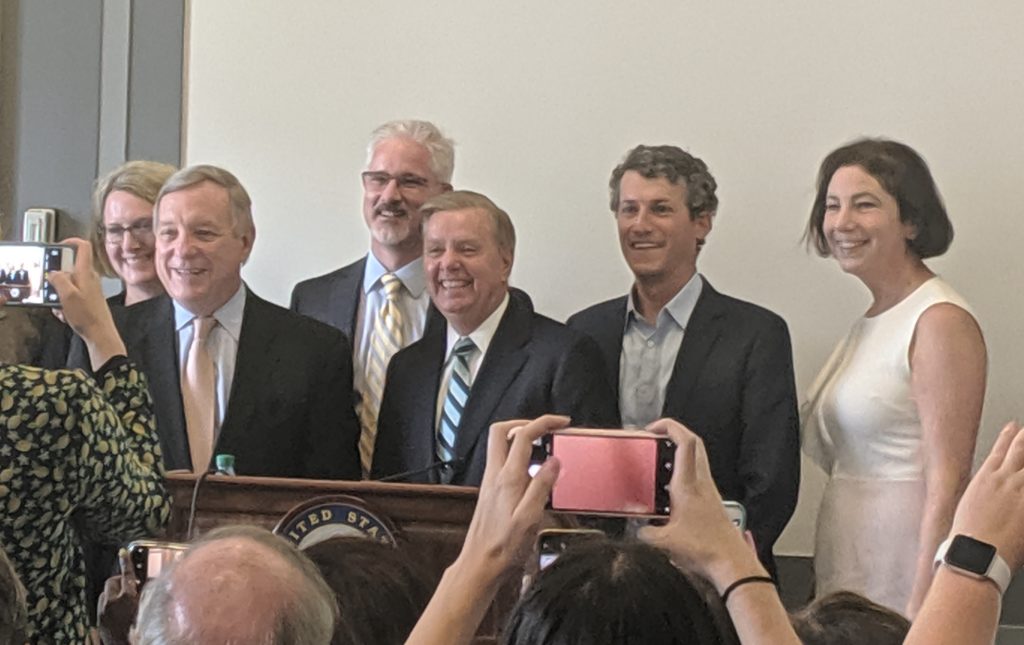July 25, 2019
On Wednesday, July 24, the House of Representatives passed two bipartisan bills to support science, technology, engineering and math. The Combatting Sexual Harassment in Science Act, HR 36, would require federal agencies to implement policies for preventing and handling sexual harassment. The Building Blocks of STEM Act, HR 1665, would direct the National Science Foundation to support STEM education research focused on early childhood. Both bills have companion legislation in the Senate.
On that same day, OSTP director Kelvin Droegemeier testified before the House Appropriations Comittee’s Commerce, Justice, and Science (CJS) Subcommittee regarding the future goals of OSTP and how they aligned with the FY2020 budget. In his opening statement, Droegemeier, the first meteorologist to lead OSTP and a figure in the administration who received bipartisan support in his confirmation hearing, called the current day a “new bold era” in science and research technology. He outlined his office’s goals which include research security, safe and inclusive research environments, the advancement of ocean technology, the promotion of the bioeconomy, and increased utilization of artificial intelligence (AI). Droegemeier also expressed his support for STEM education initiatives, and advocated for more “connective tissue” among STEM programs funded by the federal government.
Chairman Serrano stated his concern regarding the recent executive order to reduce the amount of federal advisory committees (see FABBS article), as well as what he referred to as a push to move scientific advisors outside of DC. Droegemeier was also questioned about the disconnect between his historical record of supporting increased scientific funding and the president’s proposed cuts for scientific agencies in FY2020, to which he explained that he was not yet sworn in when the budget was drafted by the president and his advisors.
Earlier this month, American Psychological Association Chief Officer Dr. Arthur Evans testified in front of the Committee on Oversight and Reform for a hearing entitled “Medical Experts: Inadequate Federal Approach to Opioid Treatment and the Need to Expand Care.” The hearing highlighted the recent activities to address the opioid crisis and addiction treatment in Congress, the Administration, as well as many of the Federal agencies and independent organizations. The hearings focused on the newly introduced CARE ACT. Dr. Evans advocated for “a ‘whole person’ approach in addressing substance use disorders, including the provision of behavioral health services.
On the Hill, Members of Congress and their staffs recently had great opportunities to learn about brain research – both briefings were standing room only, demonstrating a strong interest. The American Brain Coalition, of which FABBS is a member, in cooperation with the Congressional Neuroscience Caucus held a reception: “A Brainy Look at the Movie INSIDE OUT“. A panel of experts responded to scenes from INSIDE OUT connecting it to the latest science behind emotions, sleep and memory. Speakers included Jane M. Flinn, PhD, Cognitive and Behavioral Neuroscience Program, George Mason University; Tamar Mendelson, Johns Hopkins Bloomberg School of Public Health; and Adam P. Spira, PhD Associate Professor, Johns Hopkins Center on Aging and Health.

The “BRAIN Initiative: Revolutionizing our Understanding of the Human Brain” briefing was sponsored by ACT for NIH in collaboration with the Senate NIH Caucus, whose co-chairs Senators Durbin and Graham, provided opening remarks. First established in April 2013, funding for the BRAIN Initiative (Brain Research through Advancing Innovative Neurotechnologies) was significantly increased by Congress in the 21st Century Cures Act in 2016. Since then, NIH-funded researchers have been creating new tools which have allowed for advances in our understanding of how the brain encodes, stores, and retrieves information. FABBS hopes that future BRAIN priorities will include measures of behavior and cognition. Dr. Walter Koroshetz, Director of the National Institute of Neurological Disorders and Stroke, and co-director of the BRAIN Initiative was one of the speakers.